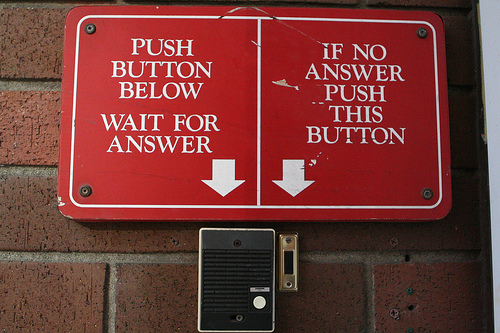The art of social redundancy


Someone will eventually help us make sense of all these various types of services, and help us separate the noise and spam from the real signal. I don’t know who’s going to do it, and I certainly don’t know how (if I did, I’d be doing it, not writing about it). But at some point soon, one of the Internet giants, or some new startup we’ve never heard of, is going to fix this mess for us.
I don't think he's wrong about the noise factor and his comparison to the messy, counter-intuitive search mess of yesteryear. One of my largest complaints about the fire hose is missed quality information amidst an overwhelming amount of useless information. As much as I think fuzzy cat videos are cute, I don't need to see them 14 times on my Facebook news or Twitter feeds, and I almost resent that such updates are inadvertently hiding information that might be more important.
While I agree with the noise complaint, I don't know that there is a tool or aggregator that can diminish the noise in the way that Arrington wants. FriendFeed has some pretty cool usability in terms of managing content and hiding types of services, but nothing intuitive enough to measure a post in value. Facebook does something similar in the way that you can block or hide entire applications. FriendFeed is also good about recommending content based on the value put upon it by our networks. The idea of a service smart enough to determine how we personally value the information coming at us from multiple streams is almost too big to consider.
Next: No one can save us... -->
Many have tried to create tools to solve human problems but have only succeeded as far as key words and categories of content, not value. Aside from one consolidated, centralized social network that brings in all of the good of existing social networks and holds an immunity to being trumped by anything potentially new, I think this is just the way that social networking is going to work... for a long time.
Yet there is something that we can do. There's an art to it, this social redundancy. It takes skill to balance the repetitive gibberish of the Web and carve out what is most likely going to meet our various personal and professional needs. We complain that we are receiving too much content and not enough value, but perhaps the reason for that is our inability to truly manage our social network connections in a way that is best for us. I know many people, yours truly included, who have a significant amount of obligatory connections or almost mandatory presences on multiple social networks. And while it's possible to hide certain types of information or create custom lists and feeds on social networks, as long as we are using multiple socnets and succumbing to the pressure to be everywhere we're going to experience noise. Perhaps we need to take back some of the responsibility for the social noise in our lives and learn the art of social redundancy.
One of the hazards of all of this simplified Web technology is how easy it is to share information (i.e. the ultra simplistic Posterous) we are developing an unrealistic expectation that the social networks should do all of the work for us as well. We complain about this noise while we sign up for new social networks and brag about making it into private betas and so on. The thing that Arrington and all of us need to remember, is that there isn't a savior powerful enough to rescue us from our unwillingness to save ourselves.
Image: http://www.flickr.com/photos/willpate/ / CC BY-NC 2.0